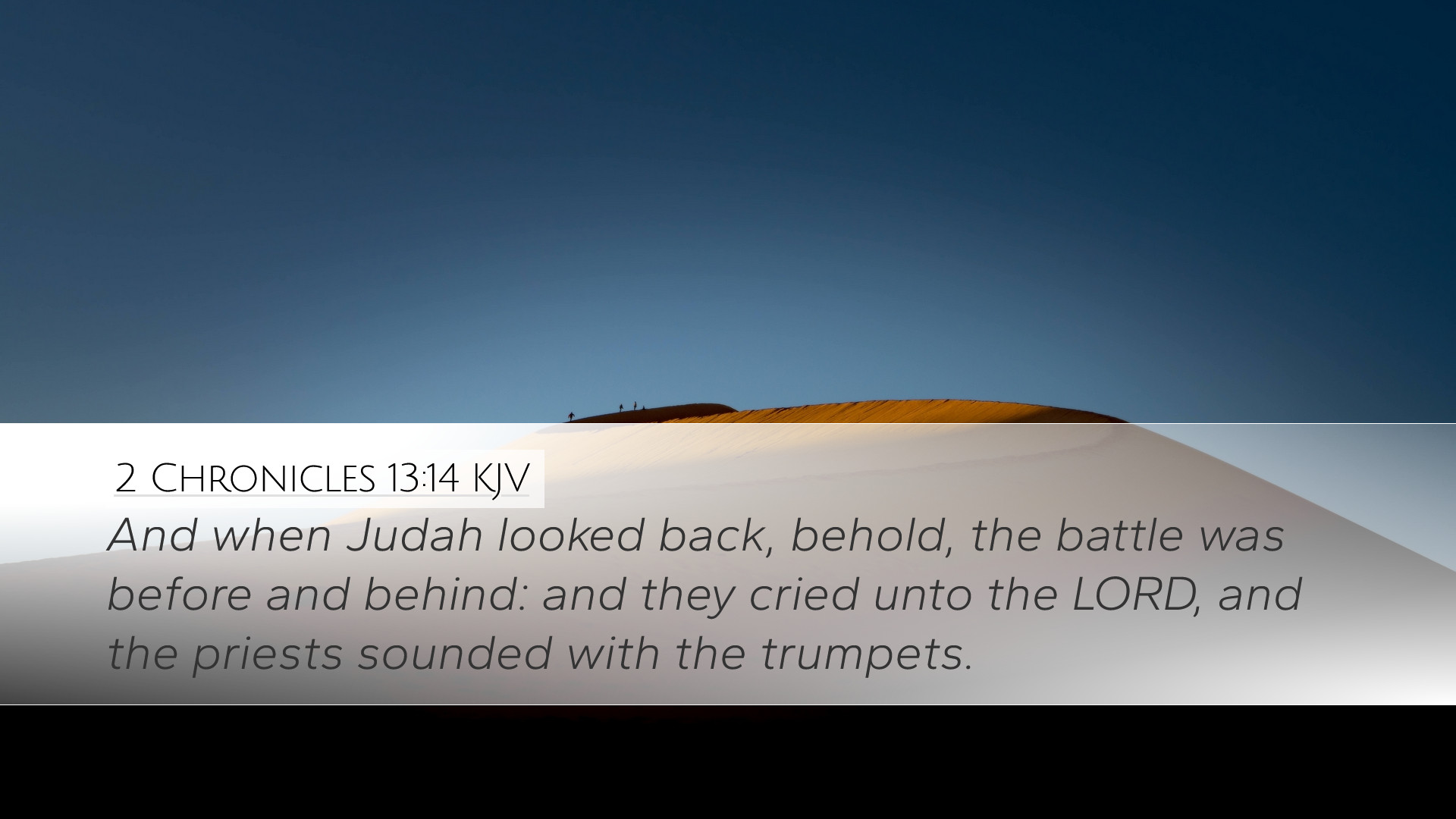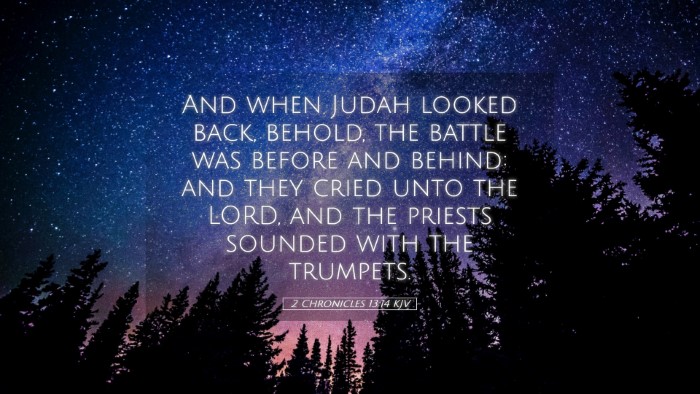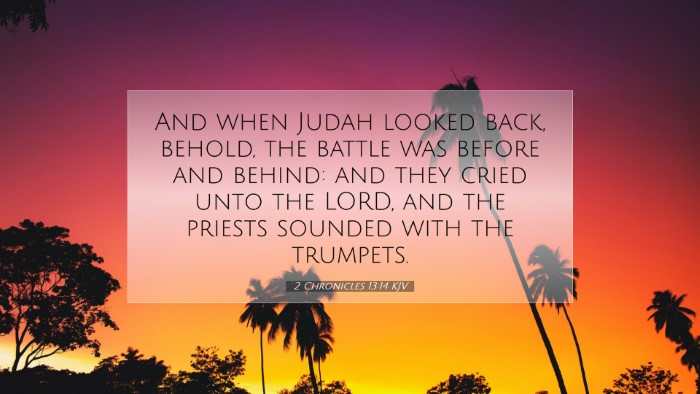Commentary on 2 Chronicles 13:14
Verse: "And when Judah looked back, behold, the battle was before and behind: and they cried unto the Lord, and the priests sounded with the trumpets."
Introduction
This verse unfolds a critical moment during the reign of King Abijah of Judah as he confronts King Jeroboam of Israel. It reflects the tension between the two kingdoms, showcasing the desperate plight of Judah as they find themselves surrounded. Various public domain commentaries provide insights into the historical, theological, and spiritual implications of this passage. In this analysis, we will explore the commentaries of Matthew Henry, Albert Barnes, and Adam Clarke to delve into the rich layers of meaning behind this scripture.
Historical Context
The backdrop of 2 Chronicles 13:14 is significant. Following the division of the unified kingdom of Israel, Judah faced threats from the northern kingdom under Jeroboam. Abijah, the king of Judah, is depicted as a descendant of David and as such appeals to the Davidic covenant. The conflict between these two nations is steeped in loyalty to God and right worship, themes prominent throughout Chronicles.
Matthew Henry's Insights
Matthew Henry emphasizes the dramatic nature of this verse, noting that Judah’s predicament symbolizes the human condition when surrounded by overwhelming odds. He comments on the dual peril faced by Judah: the enemy was not only before them but also behind. This serves as a metaphor for the trials faced by believers, often finding themselves trapped by circumstances, with no apparent escape.
Henry highlights three essential elements from this situation:
- Desperation: The cry of Judah reflects a profound desperation. In moments of crisis, true reliance on God becomes pronounced.
- Praise during Battle: The sounding of the trumpets by the priests suggests that worship and praise are integral to spiritual warfare. Even in dire circumstances, there is room for divine praise.
- Divine Deliverance: The overall narrative reassures the faithful that God hears their cries, and this incident foreshadows God’s intervention against seemingly insurmountable odds.
Albert Barnes’s Commentary
Albert Barnes provides a practical approach to understanding this verse. He notes the strategic disadvantages facing Judah, affirming that the odds were heavily against them. However, even amidst despair, Judah’s response was to call upon the Lord. Barnes argues that this moment is a pivotal example for believers: when facing trials, reliance on divine sources is paramount.
He elaborates further on the nature of the trumpets sounded by the priests:
- Trumpets as a Call to Prayer: The trumpets served as a divine summons to prayer, illustrating the necessity of seeking God in urgency.
- Symbol of Unity: The sound of the trumpets was more than a call; it represented a communal unity among the people of Judah, emphasizing the importance of collective worship.
Adam Clarke’s Perspective
Adam Clarke provides a depth of exposition through his detailed analysis. He suggests that this moment can be seen as a pivotal spiritual reflection of the state of Israel and Judah. He elucidates that facing the enemy on all sides forced Judah to return to its spiritual roots, thus reiterating the critical nature of faith in tumultuous times.
Clarke dives into the implications of the priests sounding the trumpets, associating them with:
- Remembrance of God’s Covenant: The priests’ actions remind the people of God’s past faithfulness and covenant promises, invoking a sense of hope.
- Preparation for Battle: There is an inherent call to prepare for both spiritual and physical battles through prayer and worship, reflecting the balance needed in the life of a believer.
Theological Implications
This verse resonates with theological themes prevalent through Scripture. The necessity of seeking God amidst crises is a recurring motif, evidenced here in Judah’s call to the Lord. The act of sounding the trumpets, while strategic, is also deeply rooted in worship, suggesting that spiritual preparation precedes physical confrontation.
Lessons for Believers
From the combined insights of these commentators, several lessons emerge for contemporary believers:
- Reliance on God: In moments when life’s battles seem overwhelming, it is critical to cry out to God, acknowledging our helplessness and His strength.
- Community in Worship: The importance of communal worship cannot be overstated; collective prayer strengthens faith and encourages unity.
- God’s Faithfulness: Remembering God’s past deliverances can bolster faith during current tribulations, reinforcing the belief that He is still active in the lives of His people.
Conclusion
2 Chronicles 13:14 serves as a poignant reminder of the faithfulness of God amidst conflicts. As Judah's king and people faced insurmountable odds, their instinctive reaction to cry out to God, coupled with priestly worship, symbolizes a profound truth about divine dependence. Through the insights of Matthew Henry, Albert Barnes, and Adam Clarke, we see a holistic view that invites us to contemplate the interplay between worship, community, and divine intervention. For pastors, students, theologians, and Bible scholars, this verse is a rich source of both historical reflection and spiritual application, calling us to remember the importance of turning to God in our most desperate moments.


